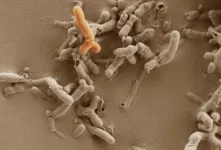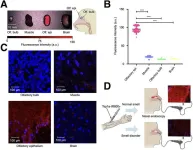(Press-News.org) A study in mice has found that the bacteria Bifidobacterium breve in the mother’s gut during pregnancy supports healthy brain development in the fetus.
Researchers have compared the development of the fetal brain in mice whose mothers had no bacteria in their gut, to those whose mothers were given Bifidobacterium breve orally during pregnancy, but had no other bacteria in their gut.
Nutrient transport to the brain increased in fetuses of mothers given Bifidobacterium breve, and beneficial changes were also seen in other cell processes relating to growth.
Bifidobacterium breve is a ‘good bacteria’ that occurs naturally in our gut, and is available as a supplement in probiotic drinks and tablets.
Obesity or chronic stress can alter the gut microbiome of pregnant women, often resulting in fetal growth abnormalities. The babies of up to 10% of first-time mothers have low birth weight or fetal growth restriction. If a baby hasn't grown properly in the womb, there is an increased risk of conditions like cerebral palsy in infants and anxiety, depression, autism, and schizophrenia in later life.
These results suggest that improving fetal development - specifically fetal brain metabolism - by taking Bifidobacterium breve supplements while pregnant may support the development of a healthy baby.
The results are published today in the journal Molecular Metabolism.
“Our study suggests that by providing ‘good bacteria’ to the mother we could improve the growth and development of her baby while she’s pregnant,” said Dr Jorge Lopez-Tello, a researcher in the University of Cambridge’s Centre for Trophoblast Research, first author of the report.
He added: “This means future treatments for fetal growth restriction could potentially focus on altering the gut microbiome through probiotics, rather than offering pharmaceutical treatments - with the risk of side effects - to pregnant women.”
“The design of therapies for fetal growth restriction are focused on improving blood flow pathways in the mother, but our results suggest we’ve been thinking about this the wrong way - perhaps we should be more focused on improving maternal gut health,” said Professor Amanda Sferruzzi-Perri, a researcher in the University of Cambridge’s Centre for Trophoblast Research and senior author of the report, who is also a Fellow of St John’s College, Cambridge.
She added: “We know that good gut health - determined by the types of microbes in the gut - helps the body to absorb nutrients and protect against infections and diseases.”
The study was carried out in mice, which allowed the effects of Bifidobacterium breve to be assessed in a way that would not be possible in humans - the researchers could precisely control the genetics, other microorganisms and the environment of the mice. But they say the effects they measured are likely to be similar in humans.
They now plan further work to monitor the brain development of the offspring after birth, and to understand how Bifidobacterium breve interacts with the other gut bacteria present in natural situations.
Previous work by the same team found that treating pregnant mice with Bifidobacterium breve improves the structure and function of the placenta. This also enables a better supply of glucose and other nutrients to the developing fetus and improves fetal growth.
“Although further research is needed to understand how these effects translate to humans, this exciting discovery may pave the way for future clinical studies that explore the critical role of the maternal microbiome in supporting healthy brain development before birth,” said Professor Lindsay Hall at the University of Birmingham, who was also involved in the research.
While it is well known that the health of a pregnant mother is important for a healthy baby, the effect of her gut bacteria on the baby’s development has received little attention.
END
Mother’s gut microbiome during pregnancy shapes baby’s brain development
2024-08-21
ELSE PRESS RELEASES FROM THIS DATE:
Humpbacks are among animals who manufacture and wield tools
2024-08-21
In a study published today in Royal Society Open Science, researchers at the Marine Mammal Research Program (MMRP) at UH Hawaiʻi Institute of Marine Biology (HIMB) and Alaska Whale Foundation (AWF) consider a new designation of the humpback whales they study: tool wielders. Researchers have known that humpback whales create “bubble-nets” to hunt, but they have learned that the animals don’t just create the bubble-nets; they manipulate this unique tool in a variety of ways to maximize their food intake in Alaskan feeding grounds. This novel research demystifies a behavior key to the whales’ survival and offers a compelling case for including humpbacks among the rare ...
UTA federal research expenditures doubled in 2023
2024-08-20
In 2023, federally sponsored research at The University of Texas at Arlington accounted for $77 million in expenditures, with about $40.7 million spent on research-related goods and services in Texas. That more than doubles the total for 2022, when federally sponsored research at UTA contributed $38 million to the economy.
The $77 million is a portion of UTA’s $122 million in total research expenditures from all sources last year. This number includes federally sponsored research awards as well as those from local and state governments, private institutions, and other sources. Overall, UT Arlington and its 270,000 alumni contribute $29 billion ...
Researchers teaching artificial intelligence about frustration in protein folding
2024-08-20
Scientists have found a new way to predict how proteins change their shape when they function, which is important for understanding how they work in living systems. While recent artificial intelligence (AI) technology has made it possible to predict what proteins look like in their resting state, figuring out how they move is still challenging because there is not enough direct data from experiments on protein motions to train the neural networks.
In a new study published in the Proceedings of the National Academy of Sciences on Aug.20, ...
Novel molecular imaging tool objectively measures and diagnoses smell disorders
2024-08-20
Reston, VA (August 20, 2024) -- A new fluorescent imaging probe can for the first time objectively and non-invasively measure loss of smell, clinically known as anosmia. Targeting the olfactory nerve, the new tool has potential to eliminate biopsies used to diagnose certain anosmia conditions and to aid in the development of therapeutic interventions. This research was published in the August issue of The Journal of Nuclear Medicine.
Research shows that an estimated 13.3 million adults in the United States have a vast range of smell disorders and that ...
Tiny killers: How autoantibodies attack the heart in lupus patients
2024-08-20
New York, NY—August 20, 2024—Cardiovascular disease is the leading cause of death in patients suffering from lupus, an autoimmune disease in which our immune system attacks our own tissues and organs, the heart, blood, lung, joints, brain, and skin. Lupus myocarditis--inflammation of the heart muscle-- can be very serious because the inflammation alters the regularity of the rhythm and strength of the heartbeat. However, the mechanisms underlying this complex disease are poorly understood and difficult to study.
A long-standing question about lupus is why some patients develop myocarditis while others remain unaffected. And why the clinical manifestations of affected ...
Study: Temporarily removing firearms from people at risk of harm saves lives
2024-08-20
DURHAM, N.C. – An estimated one life was saved for every 17 times an extreme risk protection order removed guns from people who presented a risk of harming themselves or others, according to a Duke Health-led analysis of the laws in four states.
Extreme risk protection orders -- known as ERPOs or “red flag laws" -- are civil court orders that temporarily prevent people from accessing firearms after a judge determines that they pose an imminent risk of harming themselves or others. Twenty-one states and the District of Columbia have enacted ERPO laws, mostly in ...
Study finds Americans want pandemic-era ease of applying for Medicaid
2024-08-20
More than 23 million Americans who were granted Medicaid coverage during the COVID-19 pandemic lost their coverage starting in March 2023 after the pandemic was declared no longer a public health emergency. Many likely will not successfully re-enroll on their own given Medicaid’s administrative burden—the frustrations and challenges people often encounter in seeking or complying with coverage.
Now, a study of the so-called Medicaid Great Unwinding by Dr. Simon F. Haeder with the Texas A&M University School of Public Health, ...
It only takes 15 minutes to change your health
2024-08-20
Corporate Cup, lunchtime yoga, or even ‘walk and talks’, organisations come up with all sorts of wellness initiatives to encourage people to be more active in the workplace. But before you duck and hide, new research shows that all it takes is 15 minutes and a touch of gamification to put you on the path to success.
Assessing results from 11,575 participants, across 73 Australian, New Zealand, and UK companies, University of South Australia researchers found that a gamified workplace wellness program – the 15 Minute Challenge* - leads to substantial increases in physical activity levels, with 95% of participants meeting (36%) or exceeding (59%) ...
Nadia Drake joins SETI Institute Board of Directors as observer
2024-08-20
August 20, 2024, Mountain View, CA –The SETI Institute announced that Dr. Nadia Drake is joining the SETI Institute's Board of Directors as an observer. The SETI Institute's board guides its strategic direction, finances, and various committees. As a journalist, Drake will be an active, non-voting member, bringing her broad expertise to the team.
"I am thrilled by this appointment to the SETI Institute's board, which comes at an exciting time for the SETI Institute and for the search for life beyond Earth," said Drake. "For most of my career as a science journalist, I've covered astrobiology ...
Organized youth sports are increasingly for the privileged
2024-08-20
COLUMBUS, Ohio – A sweeping study of U.S. youth sports participation over the past 60 years found that there has been a significant increase over time in kids playing organized sports – but particularly among more privileged, educated families.
A national survey found that about 70% of Americans born in the ’90s and reaching age 18 by 2015-16 said they took part in organized sports through recreational, school, or club teams. This finding showed a rather steady increase in organized sports participation across generations. Slightly more than half of those ...






